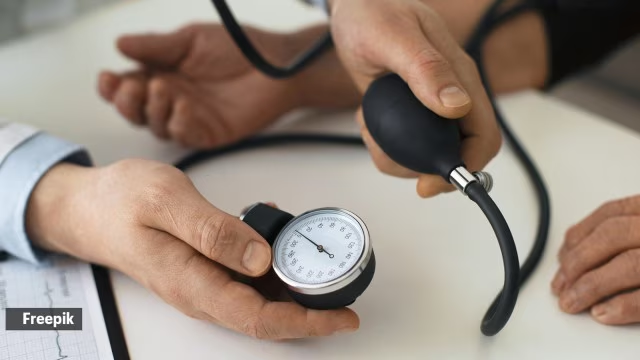Health
Lifestyle Changes Can Quickly Lower High Blood Pressure, Expert Says

When faced with high blood pressure, many seek immediate solutions beyond medication. Dr. Amit Saraf, Director of Internal Medicine at Jupiter Hospital in Thane, India, recently addressed this concern on Quora, emphasizing that targeted lifestyle modifications can yield rapid improvements. His insights, reported by The Indian Express, highlight three crucial actions: reducing salt intake, maintaining physical activity, and enhancing sleep and stress management.
Dr. Saraf elaborated on the science behind these recommendations, stating, “The fastest improvements come from three actions—cutting down salt, staying active, and improving sleep and stress management. These directly affect how blood vessels function and how much pressure the heart must generate.”
Effective Strategies for Blood Pressure Management
To effectively lower blood pressure, Dr. Saraf suggests several practical strategies.
Firstly, reducing salt consumption is vital. He recommends avoiding packaged snacks, pickles, and restaurant gravies, which often contribute to water retention and strain the arteries. Instead, individuals should focus on a diet rich in plant-based foods. Incorporating fruits, vegetables, pulses, and whole grains increases potassium intake, which helps balance sodium levels in the body.
Staying active is another essential component. Engaging in a brisk 30-minute walk, taking the stairs, or participating in light exercises can significantly enhance heart health. Dr. Saraf underscores the importance of daily activity, which can be easily integrated into one’s routine.
Moreover, prioritizing quality sleep and effective stress management techniques can help lower blood pressure naturally. Practices such as deep breathing, taking regular rest breaks, and maintaining consistent sleep patterns are beneficial.
Avoiding Harmful Habits and Monitoring Progress
In addition to these lifestyle changes, avoiding smoking and alcohol consumption is crucial. Both habits have been shown to elevate blood pressure and can accelerate heart aging.
Dr. Saraf also encourages individuals to track their blood pressure regularly. Consistency is key when implementing these changes, and monitoring progress can help reinforce positive habits.
It is important to note that for individuals with severe hypertension, diabetes, or kidney disease, lifestyle changes should complement, not replace, medical care.
In conclusion, Dr. Saraf’s guidance underscores the impact of lifestyle modifications on managing high blood pressure. By making informed choices regarding diet, physical activity, and personal well-being, individuals can take significant steps toward improving their cardiovascular health.
-

 World3 months ago
World3 months agoTest Your Knowledge: Take the Herald’s Afternoon Quiz Today
-

 Sports3 months ago
Sports3 months agoPM Faces Backlash from Fans During Netball Trophy Ceremony
-

 Lifestyle3 months ago
Lifestyle3 months agoDunedin Designers Win Top Award at Hokonui Fashion Event
-

 Sports3 months ago
Sports3 months agoLiam Lawson Launches New Era for Racing Bulls with Strong Start
-

 Lifestyle3 months ago
Lifestyle3 months agoDisney Fan Reveals Dress Code Tips for Park Visitors
-

 Health3 months ago
Health3 months agoWalking Faster Offers Major Health Benefits for Older Adults
-

 World4 months ago
World4 months agoCoalition Forms to Preserve Māori Wards in Hawke’s Bay
-

 Politics3 months ago
Politics3 months agoScots Rally with Humor and Music to Protest Trump’s Visit
-

 Top Stories4 months ago
Top Stories4 months agoUK and India Finalize Trade Deal to Boost Economic Ties
-

 Entertainment3 months ago
Entertainment3 months agoExperience the Excitement of ‘Chief of War’ in Oʻahu
-

 World4 months ago
World4 months agoHuntly Begins Water Pipe Flushing to Resolve Brown Water Issue
-

 Science3 months ago
Science3 months agoNew Interactive Map Reveals Wairarapa Valley’s Geological Secrets









